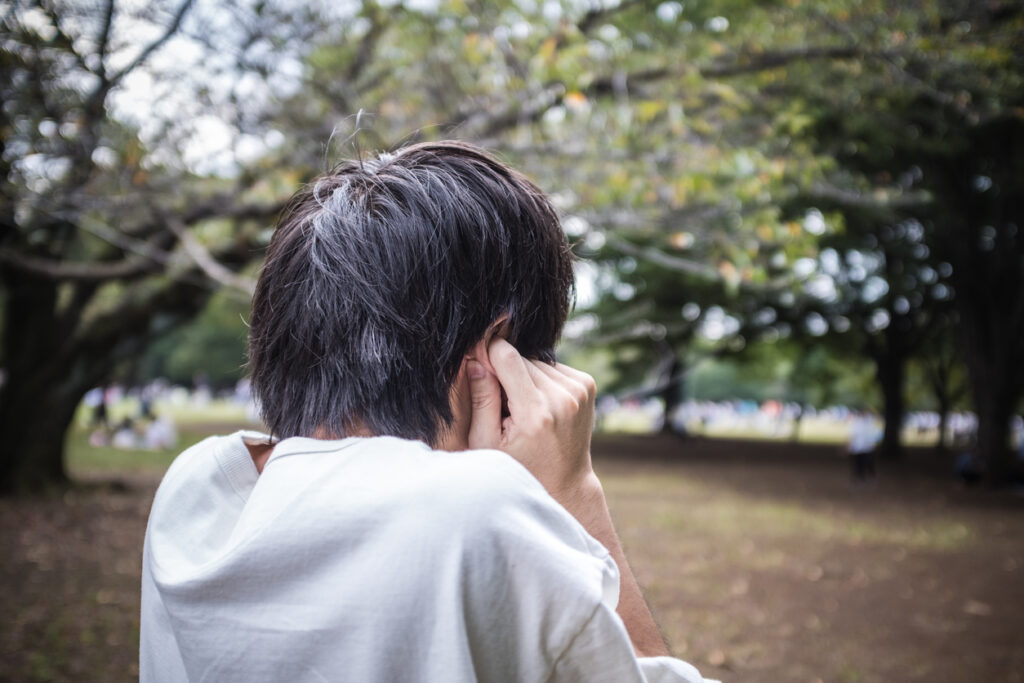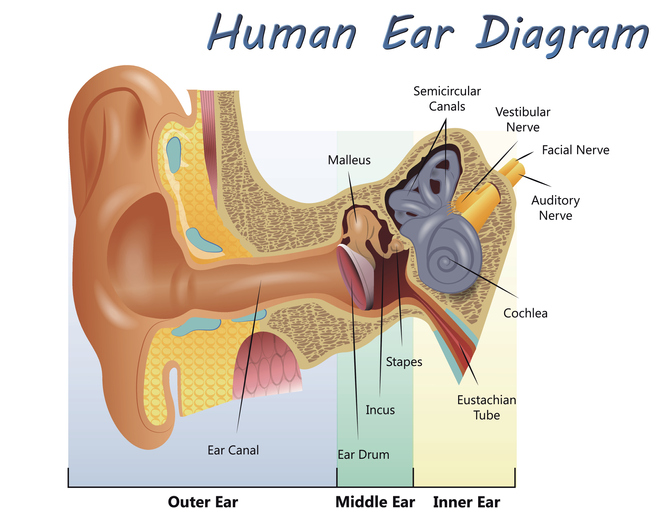
There are many people who suffer from frequent tinnitus.
They are always bothered by a ringing in the ear: when they are talking with others; having a business meeting; or even sitting quietly.
Furthermore, falling asleep becomes difficult once they notice they have tinnitus. They are bothered by the sound which no one can hear – a phantom noise. Others never know how tinnitus sounds; however, it is a fact that there are many people who suffer from it. It is estimated that tinnitus affects about 10 to 15 percent of people all over the world.
In fact, tinnitus is not a sign of anything serious. However in some cases, it may require immediate medical attention. In this article, Dr. Yoshiya Hasegawa, a neurologist who sees many patients with ear ringing, shares some insights into tinnitus and its treatment.

Tinnitus is the perception of sound without an external source.
Contents
1. What is tinnitus?
“Tinnitus” or “ringing in the ears” is the perception of noise which is not from an external source. It is a sound in one’s ears that only they can hear, and the sound is commonly described as a clicking, whistling, or hissing noise. People hear various types of sounds that may change at different times.
Tinnitus sufferers may experience various types of sound; high pitch, low pitch, deep sound, or changing sound. Regardless of the types of sounds, tinnitus is bothersome when it frequently occurs and affects one’s daily activities such as at work and/or housework. The number of people who suffer from tinnitus are increasing recently due to an ageing population and a stressful environment.
2. What causes tinnitus?
Tinnitus is deeply related to the structure and function of the ear. The ear consists of three parts – the outer ear, the middle ear and the inner ear. The sound vibration traveling through the air is transmitted to the inner ear via the outer ear and the middle ear and converted into electrical signals in the cochlea within the inner ear. Then it causes nerve impulses to be sent to the brain where they are interpreted as sound. Tinnitus is thought to be caused by “erethism” occurred in the inner ear.

Tinnitus is thought to be caused by a problem occurred in the inner ear.
3. Onset of tinnitus; how does it start, or where does it appear?
Neurologists usually respond to each tinnitus patient differently. In some cases, patients are transferred to specialists for further checkup, while others are monitored for a while. In fact, the specialist can assess the urgency only by learning about the condition of the patients.
3-1. When does tinnitus begin?
It is possible to determine if urgent medical attention is required by observing how the tinnitus appears: either suddenly or it develops gradually.
For example, if someone “experiences a sudden onset of tinnitus within a couple of months,” doctors may suspect that it is caused by an underlying serious disease. However, it may be harmless if someone says they “are bothered by tinnitus for one or two years.”
3-2. In which ear does the tinnitus occur?
It is also possible to determine if urgent medical attention is required by identifying in which ear the tinnitus occurs: in one ear or in both?
Immediate medical examination and treatment should be sought when tinnitus occurs in only one ear. Possible underlying causes are sudden sensorineural hearing loss, Meniere’s disease, or acoustic neuroma.
In most cases where tinnitus occurs in both ears, presbyacusis or noise-induced hearing loss will be suspected. These patients are monitored as the causes may not be life-threatening.
3-3. Does it accompany other symptoms?
It is also important to determine whether other symptoms appear besides tinnitus. Specialists will observe the tinnitus sufferer’s condition to identify the right causes such as;
- Hearing loss: Some patients do not notice that they have lost their hearing when doctors snap their fingers right behind their ears. This is a self-check test that patients can try; snapping their fingers to evaluate their hearing ability.
- Dizziness: Doctors will check whether tinnitus patients have experienced lightheadedness or vertigo.
- Headache / Stiff shoulders: There are cases where tinnitus is accompanied by these symptoms. However, tinnitus with headache and/or stiff shoulders are not life-threatening on many occasions.
4. Tinnitus which requires a medical visit
When someone experiences “all the symptoms mentioned in section 3” – sudden tinnitus in one ear, hearing loss and dizziness, immediate medical visit is required.
5. Diagnostic methods
The following medical examinations are administered for tinnitus patients.
5-1. Head MRI
It is very difficult to identify the problem with a head CT in the case of tinnitus. A lesion which causes tinnitus is commonly so minute that a head MRI is essential to find the problem.
5-2. Hearing test
It is hard to notice when a hearing loss occurs in one ear. One can identify their hearing loss by clicking their finger behind the ear when it is severe. However, sufferers should visit an ENT doctor for a hearing test even if the symptom is mild.

To identify a hearing loss, try whispering or snapping a finger behind the ear.
6. Most threatening disease: acoustic neuroma
Acoustic neuroma is one of the serious illnesses which must not be overlooked for patients with tinnitus.
Acoustic neuroma is a tumor that develops on the cells covering the nerves which transmit sounds. It is usually a slow-growing benign tumor, which causes various types of symptoms where the tumor grows.
Commonly the first sign of acoustic neuroma is a difficulty in hearing or tinnitus. Due to the gradual decrease of hearing ability, it is hard to notice that patients are losing their hearing at the first stage. Then it accompanies facial paralysis or facial numbness as the tumor grows. Dizziness, gait (walking) disturbance, or dysphagia (difficulty in swallowing) may occur if the tumor grows larger.
7. Treatments
The following treatments are commonly administered to tinnitus patients.
7-1. When a cause is identified
It is essential to get rid of the cause. Surgical treatment is required for tinnitus caused by acoustic neuroma or tympanitis. When the symptom is caused by Meniere’s disease, it is necessary to treat the original disease with the aid of osmotic diuresis.
7-2. When it accompanies a hearing loss caused by an inner ear disorder
Adrenocortical hormone preparations, peripheral vasodilator (Carnaculin Adenosine Triphosphate Disodium (ATP) etc.) or Vitamin B12 (Mecobalamin) is used for improving the condition of the inner ears.
7-3. Psychiatric treatments
Stress or worry may worsen the tinnitus. Some patients complain that they experience more severe tinnitus when they are tired or feel stressed. When patients feel depressed or suffer from a major depression, they tend to experience severe tinnitus, and they are usually administered antidepressants or minor tranquillizer.
8. How to cope with tinnitus
There is no definitive cure for tinnitus. However, coping strategies can improve the condition.
8-1. Medical examination as a relief
Many sufferers feel anxious when they experience a frequent onset of tinnitus. They may be worried that the tinnitus is possibly a sign of serious illness. If they are uncertain about their situation, sufferers should visit a doctor and get a head MRI and hearing test in order to be convinced that they do not have a life-threatening disease. In most cases, this helps patients cope with tinnitus.
8-2. Find another enjoyment
Many tinnitus sufferers forget their symptoms when they devote themselves to something else. It could be a hobby such as gardening and so on. When sufferers are kept active in the daytime, it induces healthy sleep and helps them avoid sleeplessness triggered by tinnitus.
8-3. Sound therapy
Given that the sound level of tinnitus which a patient hears in their ear is 10, another sound which is as high as level 8 to 9 is played. When the patient hears that sound, which is level 8 to 9, they may feel that their tinnitus noise is reduced to as low as level 1 to 2. Playing another sound helps to reduce a sensitivity of tinnitus and gives relief to the tinnitus sufferers.
Active exposure to various noises such as TV, radio, and/or talking with someone is one of several sound therapies which helps to reduce noise perception caused by tinnitus.
In order to avoid a quiet situation, a sound generator which resembles a hearing aid is used. It is effective in relieving tinnitus symptom.
9. Summary
- There are various causes of tinnitus; some requires medical checkup while others are monitored for a while.
- Immediate medical attention is required if a sudden tinnitus accompanied by hearing loss and/or dizziness occurs in one ear.
- Getting a medical examination may relieve the symptom. It is important to cope with tinnitus and keeping the mind occupied can help to distract from tinnitus noise.

